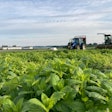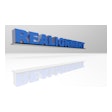European companies that use soy for animal feed or animal products are not doing enough to encourage responsible growers to reduce the negative effects of soy production, an analysis from WWF finds.
The WWF Soy Report Card 2014 also found national initiatives on responsible soy encourage better performance from companies, although there is more room for improvement.
“Europe uses 34 million tons of soy a year and needs to take more responsibility for reducing deforestation, environmental degradation and social conflict in Latin America where that soy is mainly coming from,” said Sandra Mulder, leader of WWF’s global soy program. “We are showing in this report that European companies and countries could readily do much more, starting with taking up more of the certified soy that is being produced by RTRS and ProTerra, currently the only two credible schemes for responsible soy.”
The report surveyed 88 major retailers, producers and feed suppliers from Denmark, France, the Netherlands, Sweden and the U.K., and found the best performers were concentrated among retailers, consumer goods manufacturers and the dairy industry. Little interest was being shown by most companies in the feed, meat and egg sectors and the limited progress in those sectors was driven by national programs.
“With around three-quarters of soy globally going into animal and fish feed, WWF is pleased to bring some transparency to a supply chain characterized by unfamiliar companies relatively insulated from consumer concerns about what soy production might be doing to forests, communities or the global climate,” said Mulder. “If we are to reduce the negative impacts of soy production, these are the companies that are going to have to lift their game, while the retailers and consumer product suppliers need to make sure that they do. Companies can also purchase responsible soy credits themselves in order to guarantee the products they offer to consumers are not linked to irresponsible soy production.”
Companies on track to meet goals of sourcing 100 percent of soy from certified responsible sources by 2015 included dairy companies Arla (Denmark and Sweden) and FrieslandCampina (Netherlands) and retailers Ahold (Netherlands), Marks & Spencer and Waitrose (U.K.) and feed company Lantmännen (Sweden). Companies that have started the journey to responsibly sourced soy include the French retailer Carrefour, the Dutch feed company Nutreco, and U.K. retailers Sainsbury’s and Tesco.

















